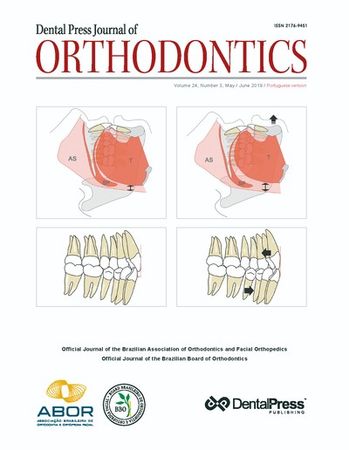Tooth extractions in Orthodontics: first or second premolars?
Artigo Selecionado BBO
Tooth crowding and protrusions demand rigorous attention during orthodontic planning that includes the extraction of first and second premolars. Some characteristics, such as dentoalveolar bone discrepancies, maxillomandibular relations, facial profile, skeletal maturation, dental asymmetries and patient cooperation, are important elements of an orthodontic diagnosis. This study discusses the options of treatments with extractions and describes the correction of a Class I malocclusion, bimaxillary protrusion, severe anterior crowding in both dental arches and tooth-size discrepancy, using...
Autores: Telma Martins De Araújo, Luciana Duarte Caldas,







The orthodontic world just recently came together at the AAO Annual Meeting, held in Los Angeles. As most professional conventions, it has the main purpose of offering to the attendee scientific, commercial and networking opportunities regarding the specialty. And it is quite natural that, while being exposed to all these resources, one ends up grasping the trend of the moment.
Leia mais
Those who do not know Lincoln Issamu Nojima may have the impression that he is a sedate professor of Orthodontics. However, this great professional has struggled and endured a difficult journey to become the orthodontist that he is today. In the beginning of his career, as he had no dependable advisor, he attended several short-duration courses. He took his first course on typodont in 1989. However, unsatisfied with his learning up to that time, he sought to improve his education by taking...
Leia mais
Objective: The purpose of the present study was to assess the prevalence of normative and perceived orthodontic treatment need in schoolchildren and adolescents, related risk factors, and children/parent’s aesthetic perception, compared to orthodontist’s opinion, in Dhaka city, Bangladesh. Methods: A random sample of 800 schoolchildren aging 11-15 years was selected from different schools in the city of Dhaka, Bangladesh. The Dental Health Component (DHC) and Aesthetic Component (AC) of the...
Leia mais
Objective: The aim of this study was to evaluate the use of glabellar vertical line (GVL) as the anteroposterior maxillary position goal. Methods: A cross-sectional study was conducted assessing 129 participants (20.21 ± 1.99 years): 67 women (20.16 ± 1.99 years), and 62 males (20.26 ± 2.06 years). The facial profile photographs were taken with a posed smile in natural head position. The linear distance from the most facial convexity of the upper central incisor (FA) to the goal...
Leia mais
Objective: The objective of this research was to demonstrate the efficiency of the overbite depth indicator (ODI) and the anteroposterior dysplasia indicator (APDI) from Kim’s cephalometric analysis, regarding the determination of the vertical and sagittal patterns of Latin American individuals. Methods: Two hundred lateral cephalometric radiographs were selected and divided into four study groups, with 50 radiographs each, for carrying out a cross-sectional study. The control group...
Leia mais
Introduction: Resting tongue posture affects the surrounding structures and, theoretically, may result in altered arch form and jaw relationship. Objective: The objective of the present study was to investigate the association between resting tongue posture as observed in lateral cephalometric radiograph, sagittal jaw relationship and arch form. Methods: The study was conducted on pretreatment lateral cephalograms and dental casts of 90 subjects. Subjects were equally divided into three...
Leia mais
Introduction: bonded fixed retainers are often used to stabilize the results obtained with the orthodontic treatment. It is important that they do not prejudice dental health, as they will be used for a long period. Objective: The purpose of the present study was to compare periodontal indexes between two types of bonded fixed retainers, conventional 3 x 3 plain retainer (0.8-mm orthodontic wire, bonded to the canines only) and a manufactured braided retainer (0.2 x 0.7-mm stainless steel...
Leia mais
Objective: The objective of the present study was to perform a histological evaluation of a titanium mini-implant for orthodontic anchorage. Shear strength and fracture patterns that occurred immediately, 30 and 60 days after insertion with or without N-2-butyl-cyanoacrylate adhesive were evaluated. Methods: Ninety-six mini-implants (Arrow, Peclab, Brazil) were placed in the tibia of 9 male rabbits, with or without an adhesive (Vetbond™, 3M, USA). Histological evaluation was done by...
Leia mais
Objective: The objective of the present study was to conduct a randomized clinical trial comparing the effects of rapid maxillary expansion (RME) and slow maxillary expansion (SME). Maxillary permanent first molar root length and tooth movement through the alveolus were studied using cone-beam computed tomography (CBCT). Methods: Subjects with maxillary transverse deficiencies between 7 and 10 years of age were included. Using Haastype expanders, children were randomly assigned to two...
Leia mais
Tooth crowding and protrusions demand rigorous attention during orthodontic planning that includes the extraction of first and second premolars. Some characteristics, such as dentoalveolar bone discrepancies, maxillomandibular relations, facial profile, skeletal maturation, dental asymmetries and patient cooperation, are important elements of an orthodontic diagnosis. This study discusses the options of treatments with extractions and describes the correction of a Class I malocclusion,...
Leia mais
Introduction: Obstructive Sleep Apnea and Hypopnea Syndrome (OSAS) is a highly prevalent disease with serious consequences for the patients’ lives. The treatment of the condition is mandatory for the improvement of the quality of life, as well as the life expectancy of the affected individuals. The most frequent treatments provided by dentistry are mandibular advancement devices (MAD) and orthognathic surgery with maxillomandibular advancement (MMA). This is possibly the only treatment...
Leia maisCopyright © 1998 - 2022 DentalGO | Todos Direitos Reservados. DentalGO é uma marca Dental Press